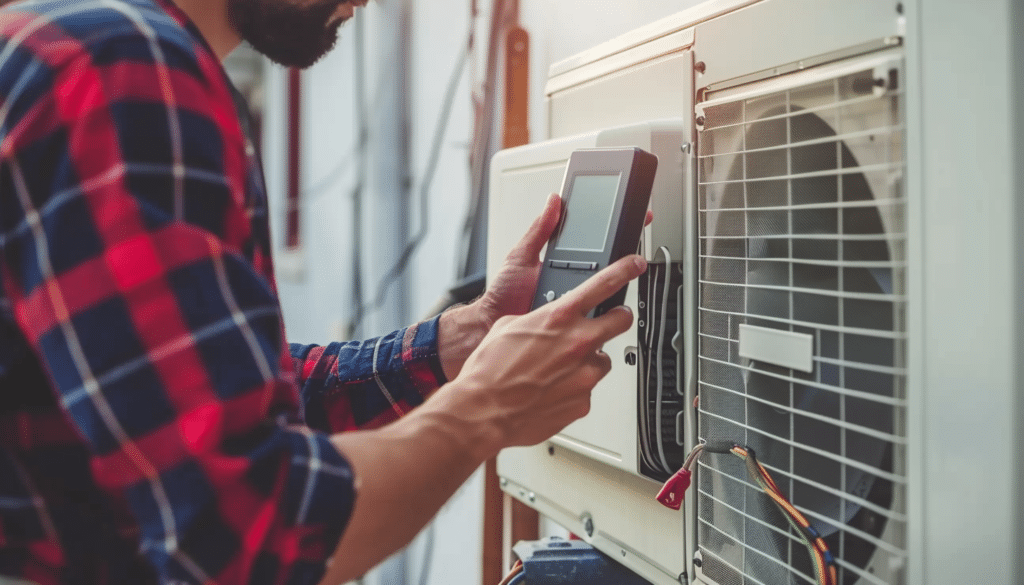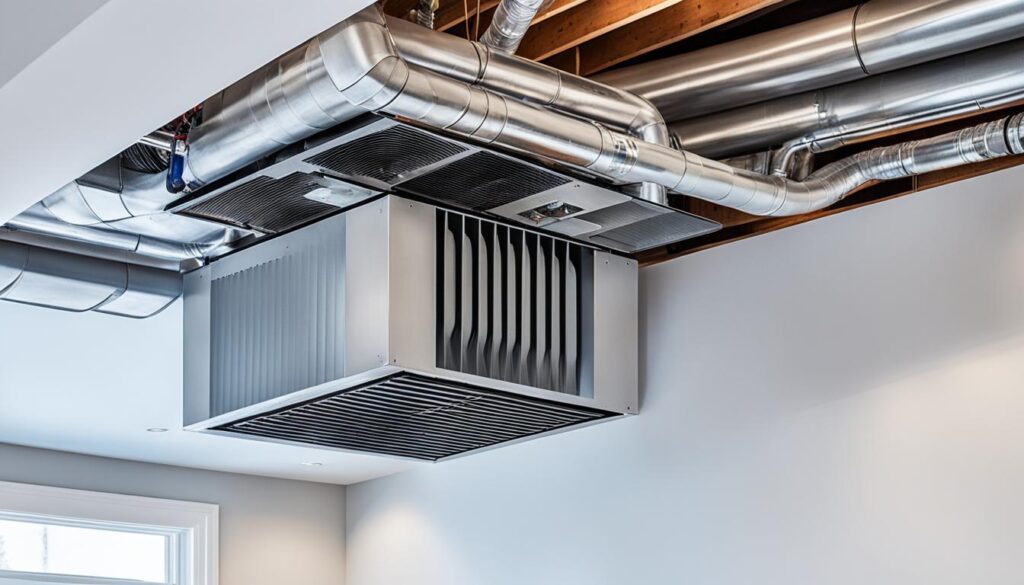18 Tips on Budgeting Home HVAC Installation Effectively
When you think about budgeting for home HVAC installation, affordability and quality can be quite challenging. However, a methodical budgeting home HVAC installation approach can help. Understanding the cost-effectiveness of your budgeting home HVAC installation choices and making an informed decision that complements your financial abilities and requirements is vital.
How do I prepare my house for HVAC installation?
Whether you’re considering a brand-new HVAC system or looking to upgrade an existing one, we’re here to guide you through the process. We’ll share insightful tips on how to maintain quality air in your home without “breaking the bank.” Our focus is on ensuring comfort and health within the confines of your budget-friendly HVAC services without compromising on the efficiency of your system.
Key Takeaways
- Installing a new HVAC system is an investment that provides long-term energy savings.
- Determining your specific HVAC needs and efficiency options is an essential step in budgeting home HVAC installation effectively.
- Considering both upfront costs and long-term expenses can result in sound, budgeting home HVAC installation decisions.
- Consulting with professional HVAC services can guide homeowners toward affordable and efficient solutions.
- Choosing the right HVAC system can enhance the quality of air in your home while aligning with your financial capabilities.
Understanding the Costs of HVAC Installation
When considering budgeting home HVAC installation solutions, one must understand that the price factor goes beyond just the initial installation cost. Several elements impact the overall expenditure, meaning the most economical home HVAC choice may not always be the least expensive option upfront.

The Average Price Range for Home HVAC Systems
The typical cost for budgeting home HVAC installation generally ranges from around $3,500 to $7,600. This varies based on several factors, including the type, size, and efficiency level of the system chosen. Making a smart, informed decision about your home HVAC installation can lead to significant long-term savings.
Factors Influencing the Total Cost of Installation
Several components contribute to the total cost of a budgeting home HVAC installation. Elements such as the purchase of the unit, labor for installation, and additional materials needed all form part of the initial cost. However, the expense doesn’t stop there. Future costs related to maintenance, usage, repairs, and, eventually, replacement must also be factored into the overall budget planning.
| Cost Factors | Description |
|---|---|
| Initial Purchase | This includes the cost of the HVAC unit itself. |
| Installation Labor | The cost of professional services to install the unit. |
| Maintenance | Regular service and upkeep to ensure optimal functioning over time. |
| Usage | Energy costs incurred from operating the HVAC system. |
| Repairs | Fixing any malfunctions or damage over the lifespan of the unit. |
| Replacement | The eventual need to replace the unit when it reaches the end of its useful life. |
Why the Cheapest Option May Not Be Cost-Effective in the Long Run
Selecting the cheapest initial option may not prove to be the most budgeting home HVAC installation in the long run. Inexpensive units can often result in higher maintenance costs and lower performance efficiency. Choosing a higher-efficiency system might incur higher costs initially but can provide substantial savings on energy bills in the long run, proving the value of spending wisely from the outset.
Assessing Your Home’s HVAC Needs and Efficiency
Identifying your residence’s specific needs is essential for a cost-effective HVAC installation. This involves determining the size and type of HVAC system that will provide optimal home heating and cooling, as well as factoring in local climate conditions. By taking a holistic approach, homeowners can make the most efficient use of their heating and cooling systems, leading to significant energy savings and long-term financial benefits.
Determining the Right Size and Type of HVAC System
The first step to identifying a home’s HVAC needs involves finding the correct size and type of system. This depends on factors such as your home’s square footage, insulation levels, and number of windows. It’s crucial to remember that a bigger system isn’t always better. An oversized HVAC system can result in frequent cycling on and off, contributing to reduced efficiency and higher operating costs. Seeking professional guidance from a licensed HVAC contractor can be instrumental in making these assessments correctly.
Climate Considerations for Heat Pump and AC Options
Climate plays a significant role in choosing the appropriate HVAC system. For instance, heat pump solutions are often perfect for regions with milder climates where electricity costs are lower than gas. They provide both heating and cooling using the same equipment, meaning a significant reduction in installation and operating expenses. In contrast, regions with more extreme temperatures might benefit from separate heating and air conditioning units.
The Value of High-Efficiency Units for Long-Term Savings
High-efficiency HVAC systems often come with a higher initial investment, courtesy of their advanced technology and superior capabilities. However, the long-term energy savings that these systems offer often counterbalance the upfront costs. Many high-efficiency HVAC systems are rated using the Seasonal Energy Efficiency Ratio (SEER), where a higher value indicates more efficient operation. Although more expensive initially, these systems can reduce utility bills over time, making them a worthwhile investment.
| System Type | Initial Cost | Long-Term Energy Savings |
|---|---|---|
| Standard Efficiency | Lower | Lower |
| High Efficiency | Higher | Higher |
To sum up, evaluating your home’s specific HVAC needs and understanding the value of a high-efficiency HVAC system can guide you toward making the best choice for your home. Taking these factors into account ensures that your HVAC system is both cost and energy-efficient, providing optimal home heating and cooling conditions while catering to personal needs and achieving significant energy savings.
Budgeting for the Lifecycle of Your HVAC System
An essential aspect of any cost-effective HVAC system is understanding the full lifecycle costs and incorporating them into your budget. No matter the initial investment, it is imperative to consider the ongoing financial aspects of an HVAC system operation. This detailed approach helps avoid financial strains and ensures year-round home comfort.
Why Opt For The Most Energy-Efficient HVAC System
One of the most significant expenses of an HVAC system lifecycle lies in regular maintenance and repair. A poorly maintained HVAC unit can lead to an immense increase in energy consumption, resulting in skyrocketing utility bills. Therefore, factoring in the cost of routine check-ups into your HVAC budget planning is critical. Moreover, HVAC system usage tends to peak during extreme weather conditions, especially in summer and winter months. These usage peaks result in energy consumption spikes and, consequently, higher utility bills. The high energy usage and its subsequent costs are an undeniable part of the HVAC system lifecycle that should be considered for future financial planning.
HVAC Energy Saving Tips
Understanding the full lifecycle costs of your HVAC system is crucial, including preparing for repairs or eventual replacement. All HVAC systems, even the best-maintained ones, will need repairs at some point. Factoring repair costs into your budget gives a clearer picture of overall maintenance expenses. Keep in mind that HVAC systems have a limited lifespan, typically 15-20 years, and will need replacing due to wear and tear or outdated technology. Regular maintenance may prolong its life, but replacement is an unavoidable expense. In essence, thorough budget planning for your HVAC ensures financial preparedness and year-round comfort in your home.
| Lifecycle stages | Expected costs |
|---|---|
| Regular maintenance | $100-$200 per year |
| Energy usage during peak months | Varies significantly based on energy prices and system efficiency |
| System repairs | Depends on the nature of the issue |
| System replacement | $3,500-$7,600 (averages for installation, excluding the system itself) |
Ultimately, budgeting for home HVAC installation is an investment comfort. By preparing for these lifecycle costs, you’ll ensure your financial readiness to maintain an enjoyable home environment throughout the year.
Leveraging Financing and Payment Options
Upfront costs for HVAC installation can seem daunting, but a diverse range of financing and payment options are available to make this necessary home improvement more accessible. Some companies offer specialized payment plans, or attractive promotions, lessening the immediate financial burden. It’s highly recommended to leave no stone unturned and explore all potential HVAC financing solutions.
“Securing favorable financing helps make HVAC system upgrades financially manageable for homeowners.”
Exploring Potential HVAC Financing Solutions
The expense of HVAC installation can be mitigated by exploring financing options such as personalized loans or manufacturer rebates. Equally impactful on available financing terms are home equity and credit rating factors. Therefore, it’s crucial to thoroughly understand your current financial status.

Advantages of Payment Plans and Promotions
Special promotions HVAC companies offer, like discounts on service packages or free add-on services, can significantly decrease your immediate financial outlays. Long-term payment plans for HVAC installation are another valuable route to explore. These not only clear the way for managing HVAC installation costs efficiently but also aid in maintaining a healthy home budget.
“Making HVAC installations financially manageable is all about tapping into the right resources.”
Ensuring Quality by Selecting the Right HVAC Contractor
When managing your HVAC system needs, the importance of employing a well-qualified contractor cannot be overstated. Superior professional HVAC maintenance services can make a significant difference in the efficient operation of your system, impacting not only your comfort levels but also your energy consumption and monthly bills. Also, the process of selecting HVAC contractors is key in obtaining accurate HVAC project quotes and achieving satisfactory project completion.
The Importance of Accurate Quotes and Professional Assessments
Investing in an HVAC system is a significant undertaking. Thus, it is vital that all costs are declared and understood before work begins. Reliable HVAC professionals provide in-depth, accurate quotes that detail all project costs, safeguarding homeowners against any hidden fees or unexpected expenses. Additionally, reputable contractors ensure professional HVAC assessments that comprise a thorough evaluation of the site and precise identification of the system best suited for your home’s specific heating and cooling requirements.
Create a Budget
Equipped with a thorough assessment and accurate quote, homeowners are in a stronger position to create a comprehensive, realistic budget that accounts for all elements of the HVAC project, from product cost to installation and future maintenance. Contrary to a budget constructed on estimates or assumptions, this method allows for an informed decision-making process, accurate cost forecasting, and practical financial management.
| Steps | Tips |
|---|---|
| Selecting a contractor | Look for licensed and insured professionals with positive reviews and solid references. |
| Obtaining quotes | Ask for detailed, itemized quotes and ensure all costs associated with the project are included. |
| Creating a budget | Include expenses for system purchase, installation, future maintenance, and potential upgrades or repairs. |
In conclusion, by selecting a reputable contractor who provides quality HVAC maintenance services and obtaining accurate quotes for the project, homeowners can create a realistic budget that caters to all aspects of the HVAC system project, from system selection to installation and future upkeep.
Budgeting Home HVAC Installation
Embarking on an endeavor to install a new HVAC system at home can be daunting, especially when taking costs into consideration. However, effective budgeting for home HVAC installation can lead to the realization of obtaining an efficient unit without placing severe strain on your financial resources. We are here to guide you. It is important to bear in mind cost-effective strategies while tackling this investment. Taking affordable home HVAC units, budget-friendly HVAC services, and low-cost HVAC installation solutions into account will help you remain within your budget.
Calculating Your Budget for a New HVAC System
When calculating the budget for a new HVAC system, an in-depth financial analysis is required. Consideration of your income, fixed and variable expenses, desires, and requirements should all be factored into this analysis. It’s best to ensure that the HVAC project aligns with your financial capabilities so that it doesn’t become a burden in the future.
Hidden Costs in HVAC Installation: What to Watch Out For
- Other costs may emerge when studying cost-efficient HVAC installation, which can surprise unsuspecting homeowners. This can lead to a budget overrun.
- These hidden fees could be associated with infrastructure enhancements such as upgrades in ductwork and drainage or special features that increase the unit’s efficiency or your home’s comfort.
budgeting home HVAC installation intelligently can prepare you for these unforeseen costs, ensuring that your money is well-invested in the acquisition and installation of your HVAC system.
By focusing on these aspects, you will be prepared to meet the financial demands of a new HVAC system head-on, helping you make the best choices for affordability and efficiency.
Comparing HVAC System Features for Cost-Efficiency
To fully leverage the cost-efficiency of your desired HVAC system, an elaborate understanding of the features and functionalities it possesses is indispensable. Two core elements paramount to your HVAC system cost-effectiveness assessment include the SEER ratings and intrinsic system features, which have been outlined below.
Evaluating SEER Ratings and Energy Savings
SEER, which stands for Seasonal Energy Efficiency Ratio, measures the energy efficiency of an HVAC system. Energy-efficient HVAC systems typically possess high SEER ratings, though they might seem costlier in the short term. The long-term benefits, however, are palpable in the form of significant energy savings. By lowering electricity bills, these systems help recover the initially higher investment over time. Simply put, a higher SEER means lower operating costs, making it a crucial factor to consider when comparing HVAC systems. Selecting an HVAC unit with a high SEER rating aligns with a commitment to environmental sustainability and smart energy use.
Additional Features that Impact HVAC System Prices
Apart from the SEER ratings, several other HVAC system features also influence the cost and efficiency of the unit. Features like air filtration systems, integrated humidifiers, and UV lights not only enhance indoor air quality but can also lead to further HVAC energy savings. However, such features often come with an increased upfront cost. Determining the need for these additional features is a key step in making an informed purchase. You must balance the initial expense with the benefits you will receive, such as improved air quality and increased unit efficiency.
Here is a simple comparison of HVAC features and their impacts on the system’s cost and efficiency:
| Feature | Additional Cost | Impact on Efficiency |
|---|---|---|
| High SEER Rating | High | Significant Energy Savings |
| Air Filtration System | Medium | Improved Air Quality, Moderate Energy Savings |
| Humidifiers | Medium to High | Improved Air Quality, Minor Energy Savings |
| UV Lights | Low to Medium | Improved Air Quality, Minor Energy Savings |
By carefully comparing and evaluating these features, you can identify the most cost-effective and energy-efficient HVAC system that best fits your budget and home requirements.
Minimizing Future Costs with Regular HVAC Maintenance
Keeping your HVAC system in great shape doesn’t just ensure a comfortable home environment—it’s also a smart way to save money. Regular maintenance is the key to extending the lifespan of your HVAC system, thereby not only reducing the need for costly repairs but also ensuring that the system operates at its peak efficiency. Investing in scheduled professional HVAC tune-ups and opting for practical HVAC maintenance plans are proven strategies to prevent surprising repair costs and optimize energy consumption.

The Role of Maintenance in Extending System Lifespan
Just like any other home appliance, an HVAC system requires regular care to stay functional and effective over the long haul. Rather than waiting for it to break down, proactive maintenance checks can help detect potential issues early, preventing small problems from becoming major, expensive fixes. With a robust HVAC maintenance plan, routine check-ups ensure that all components work harmoniously, reducing wear and tear and, hence, extending the overall lifespan of your HVAC system.
How Professional Tune-Ups Can Save You Money
“An ounce of prevention is worth a pound of cure.” — Benjamin Franklin
When it comes to HVAC systems, this adage holds true. Professional tune-ups are essentially preventative maintenance checks that keep your unit running at peak efficiency. A well-maintained HVAC system consumes less energy, which translates to lower monthly utility bills. Moreover, these tune-ups can also potentially reduce repair costs by identifying and fixing issues before they escalate into significant problems. Thus, with regular professional tune-ups, you can keep your HVAC system in prime condition, saving money and securing your home’s comfort.
Maximizing Home Energy Efficiency
The path towards minimizing HVAC bills and improving your home’s energy efficiency needn’t be strewn with obstacles. Even with a modest budget, solutions abound that can make noticeable advancements in HVAC performance and result in lower energy costs.
Upgrades that Enhance HVAC Performance and Reduce Bills
Upgrading to energy-efficient home solutions, like high SEER HVAC units and improved insulation, cuts down your utility bills. Although these options may cost more upfront, they optimize energy use and reduce long-term expenses. Even small changes, like thermal window treatments, can make a big difference by minimizing heat transfer and enhancing your home’s overall energy efficiency.
Simple Changes for Immediate Impact on Efficiency
There are also several ways to make immediate efficiency improvements without incurring high costs. These simple but effective actions can deliver instant upgrades to your home’s HVAC performance.
- Programmable Thermostat: Installing a programmable thermostat allows for better control of your home’s heating and cooling, enabling more efficient usage and energy savings.
- Regular Filter Replacements: Keep your HVAC running at its best by ensuring your air filters are clean. Regularly replacing your system’s air filters can increase its performance, reduce energy consumption, and extend its lifespan.
By implementing these strategies, you can maintain a budget-conscious approach to HVAC management without compromising on the quality of home comfort. These measures work to increase energy efficiency, cut down operating costs, and pave the way towards a greener, more sustainable future.
Conclusion
As we come to the conclusion of our comprehensive guide to cost-efficient HVAC installation, we understand the importance of a comprehensive approach. It’s not about merely focusing on the immediate financial obligations but understanding the long-term implications as well. A well-planned installation process doesn’t just offer immediate heating and cooling solutions but can deliver existing financial benefits over time.
A Comprehensive Approach to Budgeting Home HVAC Installation
Smart budgeting for home HVAC installation involves a thorough consideration of several factors, such as initial installation costs, lifecycle expenses, and the opportunity for long-term savings. Comprehensive HVAC planning allows homeowners to make informed decisions that address not only their immediate needs but also future financial considerations.
Making Smart Investments for Home Comfort and Efficiency
Investing your resources wisely is crucial for long-term satisfaction. It involves taking advantage of favorable financing options, selecting the right contractor for the job, and making sure to choose high-quality, high-efficiency systems. By doing so, homeowners maximize the return on their investment. More importantly, they ensure the comfort they seek and deserve. Ultimately, it’s not only about transforming your house into a comfortable living space; it’s also about enabling it to be your cost-efficient home. The successful combination of home comfort and HVAC energy efficiency symbolizes a smart investment, making your living space more enjoyable and your life easier.
FAQ’s
What should I consider when budgeting home HVAC installation?
When planning for budgeting home HVAC installation, consider factors like your specific needs – the size and type of HVAC system, local climate, and efficiency of the unit. Understand that the most affordable option initially might save you money in the short term, but choosing a high-efficiency system will provide significant long-term financial savings.
How much does a typical HVAC system installation cost?
The cost of installing an HVAC system in a home could range significantly from around 500 to 600 depending on various factors such as the type of unit, size, and its energy efficiency. Further costs could include maintenance costs, usage, and system repairs or replacement.
What is the importance of SEER ratings?
Understanding SEER (Seasonal Energy Efficiency Ratio) ratings and their correlation with energy savings is paramount. Efficient systems with higher SEER ratings may come with elevated upfront costs, but they offer significant long-term savings on energy bills.
What are the potential hidden costs of HVAC installation?
Hidden costs could include infrastructure upgrades, such as upgrades to existing ductwork or drainage, or special features like air filtration, humidifiers, or UV lights that can impact the final price of budgeting home HVAC installation.
How can regular HVAC maintenance minimize future costs?
Routine professional maintenance is a critical factor in extending the lifespan of an HVAC system and aligns with a budget-conscious approach by minimizing unexpected repair costs. A maintenance plan can provide not only preventative care and early detection of issues but also benefits such as priority service and repair discounts.
How can I maximize energy efficiency at home?
Homeowners can maximize energy efficiency with various upgrades. High SEER-rated equipment, improved insulation, and thermal window treatments can help reduce energy consumption and lower utility costs. Even simple measures like installing a programmable thermostat or regularly replacing air filters can have an immediate positive impact on energy efficiency.
Are there financing solutions available for HVAC installation?
Yes, most HVAC companies offer various financing and payment options to make budgeting home HVAC installation effective. Options can include specialized payment plans, attractive promotions, loans, and manufacturer rebates.

